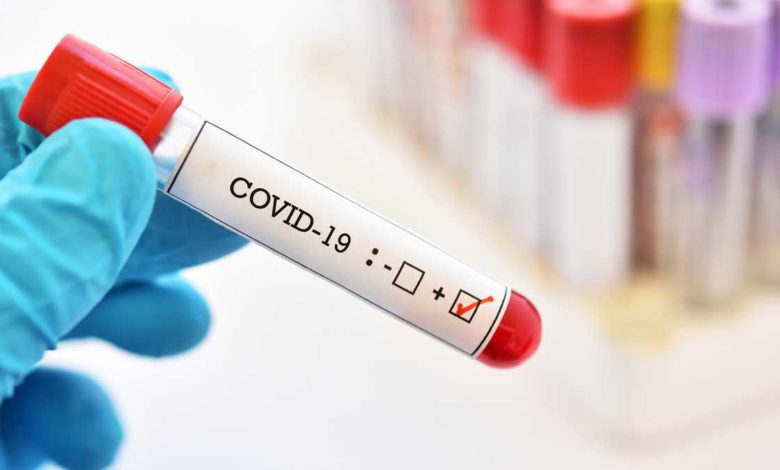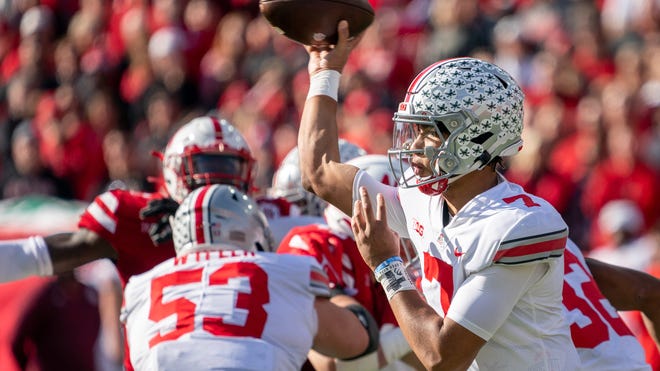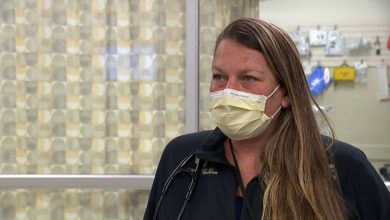

Video above: FDA says Johnson & Johnson COVID-19 vaccine risk is lowAfter several weeks of reporting concerning COVID-19 case increases, a leading health official says the U.S. could be starting to see a hopeful trend.The country's seven-day average of new reported infections is going down, Centers for Disease Control and Prevention Director Dr. Rochelle Walensky said during a White House COVID-19 briefing on Friday.But what's concerning officials now, Walensky said, are the "unsettling gaps" in COVID-19 vaccine coverage in different parts of the country. "Some areas are doing very well with greater than 65% coverage for those over the age of 65... but many areas have far less coverage, less than 47%," she said. "Because this virus is an opportunist, we anticipate that the areas of lightest vaccine coverage now might be where the virus strikes next."Experts have stressed for months that the best way Americans can protect themselves -- and their communities -- is through COVID-19 vaccinations which can, when enough people are vaccinated, suppress the spread of the virus. "I think it's really important to understand that vaccines work best at a population level, not at the individual level," infectious diseases specialist and epidemiologist Dr. Celine Gounder told CNN on Saturday. "If you're in a community that is swimming with virus, 95% reduction is good, but you're still at risk.""Really the best way to reduce the risk for all of us is for as many people to get vaccinated as possible," Gounder added.PGRpdiBjbGFzcz0iaW5mb2dyYW0tZW1iZWQiIGRhdGEtaWQ9ImJhMjIxYWIxLTEwMDQtNGI1Zi05NDAwLThlMzUzOGIzYmRhZCIgZGF0YS10eXBlPSJpbnRlcmFjdGl2ZSIgZGF0YS10aXRsZT0iVW5pdGVkIFN0YXRlcyBDT1ZJRCBWYWNjaW5lIEluZm9ncmFtIj48L2Rpdj48c2NyaXB0PiFmdW5jdGlvbihlLGksbixzKXt2YXIgdD0iSW5mb2dyYW1FbWJlZHMiLGQ9ZS5nZXRFbGVtZW50c0J5VGFnTmFtZSgic2NyaXB0IilbMF07aWYod2luZG93W3RdJiZ3aW5kb3dbdF0uaW5pdGlhbGl6ZWQpd2luZG93W3RdLnByb2Nlc3MmJndpbmRvd1t0XS5wcm9jZXNzKCk7ZWxzZSBpZighZS5nZXRFbGVtZW50QnlJZChuKSl7dmFyIG89ZS5jcmVhdGVFbGVtZW50KCJzY3JpcHQiKTtvLmFzeW5jPTEsby5pZD1uLG8uc3JjPSJodHRwczovL2UuaW5mb2dyYW0uY29tL2pzL2Rpc3QvZW1iZWQtbG9hZGVyLW1pbi5qcyIsZC5wYXJlbnROb2RlLmluc2VydEJlZm9yZShvLGQpfX0oZG9jdW1lbnQsMCwiaW5mb2dyYW0tYXN5bmMiKTs8L3NjcmlwdD4KU.S. Surgeon General Dr. Vivek Murthy also highlighted the importance of widespread vaccinations in Friday's briefing."This is one of those moments where we have to decide who we are as a country," he said. "Are we 300 million people who happen to live in the same place? Or are we fellow Americans who recognize we're stronger when we care for and protect one another?" "If we do this together," Murthy added, "We will turn this pandemic around."Reports warn of vaccine 'tipping point'In parts of the country, some local officials are reporting drops in demand for COVIID-19 shots.And in just a few weeks' time, the U.S. could hit a "tipping point" on vaccine enthusiasm and supply will likely outstrip demand, a Kaiser Family Foundation report said."Once this happens, efforts to encourage vaccination will become much harder, presenting a challenge to reaching the levels of herd immunity that are expected to be needed," the report said.So far, roughly 41.8% of the U.S. population has received at least one dose of a COVID-19 vaccine, CDC data shows, and about 28% of the population is fully vaccinated.Some experts, including Dr. Anthony Fauci, have estimated somewhere between 70% to 85% of Americans need to have immunity to the virus -- either through vaccination or previous infection -- to control its spread.Behind the slowing vaccine demand are several factors, experts say, including vaccine hesitancy. In their latest COVID-19 briefing, the University of Washington's Institute for Health Metrics and Evaluation wrote that the "slow erosion of vaccine confidence unfolding over the last two or more months is cause for concern.""Facebook runs a survey every day, and we look at that data on a daily basis and that's shown that vaccine confidence in the U.S. has been slowly but steadily going down since February," IHME Director Dr. Chris Murray told CNN on Friday."There's a lot of people out there, and it's a growing fraction of people, who are not sure they want to get the vaccine, and that's really important that we overcome that," he added.COVID-19 vaccinations declined last weekSome officials worry the recent recommended pause on the Johnson & Johnson COVID-19 vaccine could have also further fueled hesitancy.The CDC and the Food and Drug Administration lifted that pause recommendation on Friday, saying the vaccine label will be updated to warn of blood clot risks. "We have concluded that the known and potential benefits of the Janssen COVID-19 vaccine outweigh its known and potential risks in individuals 18 years of age and older," acting FDA Commissioner Dr. Janet Woodcock said in a statement.The administration of the J&J vaccine can resume "immediately," Walensky said Friday.The pause contributed to a decline in the total number of Americans who got vaccinated last week, the CDC's Dr. Amanda Cohn said Saturday."Last week was the first week that we saw a decline in vaccination, in terms of the total number of people who got vaccinated over the course of the week, and there is clearly the contributory factor of the pause in the J&J vaccine," Cohn said.In a statement on Saturday, New York Gov. Andrew Cuomo announced the state would immediately resume administering the J&J vaccine at all state-run sites."The vaccine is the weapon that will win the war against COVID and allow everyone to resume normalcy, and we have three proven vaccines at our disposal," the governor said in a statement. "The sooner we all get vaccinated, the sooner we can put the long COVID nightmare behind us once and for all."New Jersey's top health official also recommended that the state resumes administering the single-shot vaccine.
Video above: FDA says Johnson & Johnson COVID-19 vaccine risk is low
After several weeks of reporting concerning COVID-19 case increases, a leading health official says the U.S. could be starting to see a hopeful trend.
The country's seven-day average of new reported infections is going down, Centers for Disease Control and Prevention Director Dr. Rochelle Walensky said during a White House COVID-19 briefing on Friday.
But what's concerning officials now, Walensky said, are the "unsettling gaps" in COVID-19 vaccine coverage in different parts of the country.
"Some areas are doing very well with greater than 65% coverage for those over the age of 65... but many areas have far less coverage, less than 47%," she said. "Because this virus is an opportunist, we anticipate that the areas of lightest vaccine coverage now might be where the virus strikes next."
Experts have stressed for months that the best way Americans can protect themselves -- and their communities -- is through COVID-19 vaccinations which can, when enough people are vaccinated, suppress the spread of the virus.
"I think it's really important to understand that vaccines work best at a population level, not at the individual level," infectious diseases specialist and epidemiologist Dr. Celine Gounder told CNN on Saturday. "If you're in a community that is swimming with virus, 95% reduction is good, but you're still at risk."
"Really the best way to reduce the risk for all of us is for as many people to get vaccinated as possible," Gounder added.
n
n
n
Reports warn of vaccine 'tipping point'
In parts of the country, some local officials are reporting drops in demand for COVIID-19 shots.
And in just a few weeks' time, the U.S. could hit a "tipping point" on vaccine enthusiasm and supply will likely outstrip demand, a Kaiser Family Foundation report said.
"Once this happens, efforts to encourage vaccination will become much harder, presenting a challenge to reaching the levels of herd immunity that are expected to be needed," the report said.
So far, roughly 41.8% of the U.S. population has received at least one dose of a COVID-19 vaccine, CDC data shows, and about 28% of the population is fully vaccinated.
Some experts, including Dr. Anthony Fauci, have estimated somewhere between 70% to 85% of Americans need to have immunity to the virus -- either through vaccination or previous infection -- to control its spread.
Behind the slowing vaccine demand are several factors, experts say, including vaccine hesitancy.
In their latest COVID-19 briefing, the University of Washington's Institute for Health Metrics and Evaluation wrote that the "slow erosion of vaccine confidence unfolding over the last two or more months is cause for concern."
"Facebook runs a survey every day, and we look at that data on a daily basis and that's shown that vaccine confidence in the U.S. has been slowly but steadily going down since February," IHME Director Dr. Chris Murray told CNN on Friday.
"There's a lot of people out there, and it's a growing fraction of people, who are not sure they want to get the vaccine, and that's really important that we overcome that," he added.
COVID-19 vaccinations declined last week
Some officials worry the recent recommended pause on the Johnson & Johnson COVID-19 vaccine could have also further fueled hesitancy.
The CDC and the Food and Drug Administration lifted that pause recommendation on Friday, saying the vaccine label will be updated to warn of blood clot risks.
"We have concluded that the known and potential benefits of the Janssen COVID-19 vaccine outweigh its known and potential risks in individuals 18 years of age and older," acting FDA Commissioner Dr. Janet Woodcock said in a statement.
The administration of the J&J vaccine can resume "immediately," Walensky said Friday.
The pause contributed to a decline in the total number of Americans who got vaccinated last week, the CDC's Dr. Amanda Cohn said Saturday.
"Last week was the first week that we saw a decline in vaccination, in terms of the total number of people who got vaccinated over the course of the week, and there is clearly the contributory factor of the pause in the J&J vaccine," Cohn said.
In a statement on Saturday, New York Gov. Andrew Cuomo announced the state would immediately resume administering the J&J vaccine at all state-run sites.
"The vaccine is the weapon that will win the war against COVID and allow everyone to resume normalcy, and we have three proven vaccines at our disposal," the governor said in a statement. "The sooner we all get vaccinated, the sooner we can put the long COVID nightmare behind us once and for all."
New Jersey's top health official also recommended that the state resumes administering the single-shot vaccine.
Source link








